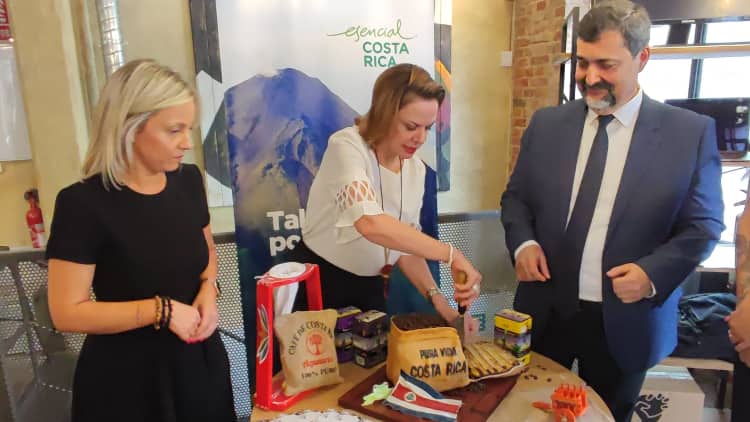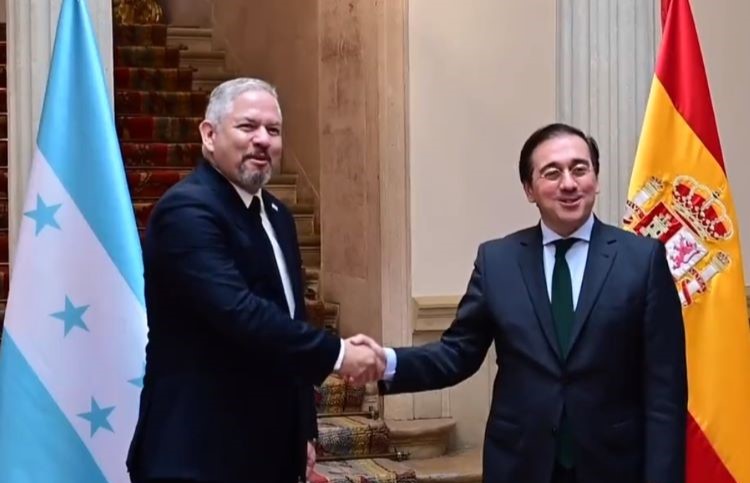Juan David Latorre
Pura Vida’ is the term Costa Ricans use to describe something or a situation where everything is fine, where there is no room for stress or worries. And this sensation, an instant fullness of Pura Vida, is what those attending the 2nd Central American Coffee Tasting organised last Wednesday by The Diplomat in Spain and the company Alma Speciality, together with the Costa Rican Embassy, felt.
In a Camden Coffee Roasters (Calle del Acuerdo 31) packed with Spanish coffee professionals and friends, the Costa Rican producers Coopetarrazú and Hacienda Tobosi presented their premium productions exclusively for the first time in Spain.
As could not be otherwise, the Costa Rican ambassador, Ana Helena Chacón, and the director of PROCOMER in Europe and the Middle East, Jorge Zamora, gave their full support to the two guest producers from the outset and presented the great achievements and extraordinary characteristics of Costa Rican coffee to the attendees.

“Instead of Hola, we say Pura Vida. Instead of how are you, we say how are you, Pura Vida“, Ambassador Ana Helena stressed. And the truth is that life has become an essential element at this moment in world history. The struggle to survive, after the pandemic, the struggle for life in a continent that is at war, the struggle for people to have a good quality of life, that is precisely what existence is all about. And coffee makes us an essential part of a social division in a country where we have been able to safeguard the Pura Vida”.
“With coffee, Costa Rica was put in the spotlight,” the ambassador pointed out, as the country has no other major production sector. “Coffee was the Costa Rican currency. Coffee was what began to be exported in ox carts with their characteristic big wheels so that they could pass through the mud of what were our small streets. This also helped to lift many families out of poverty and redistribute Costa Rica’s wealth a little better”.
“Believe in Spain,” Ambassador Ana Helena concluded, “that Costa Rican coffee should be drunk and consumed by Spaniards, so that just as we have learned in Costa Rica to distinguish a good wine, you will also learn to distinguish our excellent coffees.

The director of PROCOMER, Jorge Zamora, then took the floor, who wanted first of all to thank Camden Coffee Roasters “for having us here, in such a spectacular and welcoming place, Bodegas Masaveu for the wines that we will be tasting, Dulce Locura Madrid for the impressively detailed and delicately designed cake they have made for this tasting, and Chula beers, which we will also be tasting after coffee”.

Jorge Zamora pointed out that it was not “until 1840 that coffee began to be exported from Costa Rica to England. And the government, with a very good vision, decided that all Costa Ricans should have their own plot of coffee. This led to the creation of small producers and this is part of the democratic basis of the country and has contributed in large part to the development and economic stability of Costa Rica”.
The director of PROCOMER also pointed out the important role of the coffee sector in the country’s cultural development, as “with a coffee tax an architectural jewel was built, the National Theatre, where the great works of concerts, theatre, ballet and music are presented. The National Football Stadium was also built, a modern stadium in the shape of a coffee bean”.


“One hundred percent of our coffee is of the Arabica spice, of the Caturra and Catuaí varieties, which produces a higher quality bean and a cup with better notes and organoleptic characteristics, pleasant, aromatic and fine. Our coffee is grown in fertile soil of volcanic origin. In an area such as the Autonomous Community of Extremadura, we have 112 volcanoes, fortunately very few of them active, but this allows fertile soils with low acidity. All this, together with Costa Rica’s altitude and average temperature, are favourable conditions for a fine coffee, a speciality coffee”.
Jorge Zamora introduced the two producers invited to the presentation “two companies that have done an enormous amount of work for years, developing the quality and excellence of their coffees. Fabián Calderón of Coopetarrazú and Jorge Brenes of Hacienda Tobosi spoke.
The presentation was also attended by representatives of the Venezuelan Embassy, as well as different businessmen with numerous commercial relations between their countries and Spain, who, together with the professionals from the coffee sector, made the business part of the event end very well.

As in the 1st Tasting, Camdem Coffee Roasters offered an appetizer to the guests, prepared by its chef Javier Roca, in which the Pagos de Araiz Winery (Olite, Navarra), belonging to the Masaveu Bodegas wine group, offered one of its most awarded wines, the Pagos de Araiz Crianza 2019, while the Villa de Madrid Brewery group did the same with a selection of varieties of its new craft beer, La Chula.







